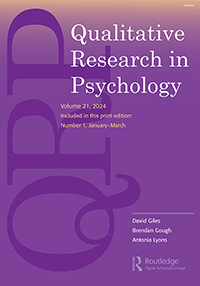质的研究视野融合:伽达默尔与文化共鸣
IF 4.4
3区 心理学
Q1 PSYCHOLOGY, MULTIDISCIPLINARY
引用次数: 2
摘要
摘要在这篇文章中,我探讨了Hans-Georg Gadamer的“视野融合”和口译员的“偏见”之间的交叉点,以及文化共鸣的概念,因为它们与心理学的定性研究有关。我将文化共鸣定义为研究人员在对文本进行解释时产生的不同文化联想和/或内涵(例如,神话、传说、流行媒体参考)。通过阅读伽达默尔的理论,我进一步解释了文化共鸣是如何包含在他所说的口译员的语言、偏见、视野和游戏中的。因此,受伽达默尔断言理解总是一个不同知识世界(视野)融合在一起的过程的启发,并参考精神分析的遐想、波什的文化心理学概念和叙事理论,我讨论了文化共鸣作为一个在定性研究中不可避免地展开的视野。最后,根据文章中讨论的不同主题,我提供了一个受伽达默尔启发的框架,用于在定性解释中使用文化共鸣。讨论了这个框架的局限性及其优点,包括自反性、力量、严谨性和文化敏感性。本文章由计算机程序翻译,如有差异,请以英文原文为准。
Fusing horizons in qualitative research: Gadamer and cultural resonances
ABSTRACT In this article, I explore the intersection between Hans Georg Gadamer’s ‘fusion of horizons’ and interpreter’s ‘prejudices,’ together with the concept of cultural resonances as they pertain to qualitative research in psychology. I define cultural resonances as the researcher’s different cultural associations and/or connotations (e.g., myths, legends, popular media references), that emerge in an interpretive encounter with a text. Through a reading of Gadamer’s theory, I further explain how cultural resonances are contained within what he referred to as the interpreter’s language, prejudice, horizon, and play. Therefore, inspired by Gadamer’s assertion that understanding is always a process in which different worlds of knowledge (horizons) fuse together, and with reference to psychoanalytic reverie, Boesch’s concepts of cultural psychology, and narrative theory, I discuss cultural resonances as a horizon that inevitably unfolds in qualitative research. Finally, relying on the different topics discussed in the article, I offer a Gadamer-inspired framework for using cultural resonances in qualitative interpretation. The limitations of this framework, as well as its advantages, are discussed, with regard to reflexivity, power, rigor, and cultural sensitivity.
求助全文
通过发布文献求助,成功后即可免费获取论文全文。
去求助
来源期刊

Qualitative Research in Psychology
PSYCHOLOGY, MULTIDISCIPLINARY-
CiteScore
20.00
自引率
0.50%
发文量
14
期刊介绍:
Qualitative Research in Psychology is an international, peer-reviewed journal that publishes high-quality, original research. It aims to become the primary forum for qualitative researchers in all areas of psychology, including cognitive, social, developmental, educational, clinical, health, and forensic psychology. The journal also welcomes psychologically relevant qualitative research from other disciplines. It seeks innovative and pioneering work that advances the field of qualitative research in psychology.
The journal has published state-of-the-art debates on various research approaches, methods, and analytic techniques, such as discourse analysis, interpretative phenomenological analysis, visual analyses, and online research. It has also explored the role of qualitative research in fields like psychosocial studies and feminist psychology. Additionally, the journal has provided informative articles on ethics, transcription, interviewee recruitment, and has introduced innovative research techniques like photovoice, autoethnography, template analysis, and psychogeography.
While the predominant audience consists of psychology professionals using qualitative research methods in academic, clinical, or occupational settings, the journal has an interdisciplinary focus. It aims to raise awareness of psychology as a social science that encompasses various qualitative approaches.
In summary, Qualitative Research in Psychology is a leading forum for qualitative researchers in psychology. It publishes cutting-edge research, explores different research approaches and techniques, and encourages interdisciplinary collaboration.
 求助内容:
求助内容: 应助结果提醒方式:
应助结果提醒方式:


